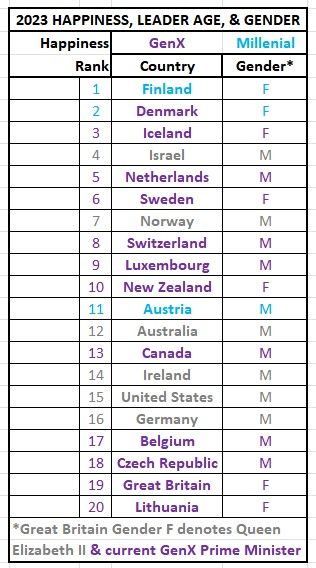Happiness
Women Under 50 Lead the World’s 3 Happiest Countries
Happiness trends toward female and youthful leadership.
Posted July 27, 2023 Reviewed by Jessica Schrader
Key points
- Of the top 20 happiest countries, 35 percent are led by women compared to 10 percent worldwide.
- Countries with female leaders recorded 40 percent fewer COVID-19 deaths than those governed by men.
- The World Economic Forum’s high gender-equality rankings correlate with high life-satisfaction rankings.
The 2023 Gallup and United Nations’ World Happiness Study ranks the happiness of citizens in 150 countries based on a three-year life evaluation average from 2020-2022 and considers six different elements: sufficient income, physical and mental health, social support (having someone to count on), sense of freedom to make key life decisions and exercise human rights, generosity/community engagement, and the absence of corruption. The following characteristics are more likely in the top 20 happiest countries:

Women Heads of State
The ratio of 7 out of the top 20 happiest countries (35%) led by women far exceeds the 10% of women-led countries worldwide.
Finland, until recently led by Prime Minister Sanna Marin, voted its 5.5 million people the happiest population in the world for the sixth year in a row. Second is Denmark, whose Prime Minister Mette Frederiksen leads as Denmark’s youngest prime minister since June 2019. Third is Iceland, also a Scandinavian country. Its Prime Minister Katrín Jakobsdóttir has been in office since 2017.
Other top-ranking countries include Sweden (sixth), which was led by Magdalena Andersson as Prime Minister from November 2021 to October 2022, New Zealand (10th) with Jacinda Ardern, who stepped down from the role earlier this year, and Great Britain (ranked 19th) which was ruled by Queen Elizabeth II for 70 years until her death in 2022. And 20th-ranked Lithuania’s Prime Minister Ingrida Šimonytė has served since December 2020.
Fewer COVID Deaths
The three happiest countries had fewer COVID-19 deaths, in line with studies prior to and during the pandemic that female leaders outperform their male counterparts during crises. Specifically, life satisfaction impacted COVID-19 outcomes negatively, whereas countries with female leaders, as reported in a transnational study affiliated with the Singapore University of Social Sciences and Queensland University, recorded 40 percent fewer COVID-19 deaths than those governed by men. The United Nations finds that female leaders act promptly and decisively, as did the Singapore study. The study also found that female leaders are more risk-averse toward the loss of human life, which plays an essential role in pandemic prevention and outcome.
Child Care Support for Working Parents
The three happiest countries rank high alongside all the Nordic countries in providing widespread child care. Notably, the United Nations found that Norwegian communities led by majority-women councils had better child-care coverage than those led by predominantly male councils. A recent Bloomberg report named three of the 20 happiest countries—Germany, Iceland, and Canada—as the best countries in the world for working parents for child-care costs, and many others among the top 20 also score high for child care.
Gender Equity
The World Economic Forum’s gender equality rankings correlate with life satisfaction rankings. Finland ranked second globally for gender equality last year. More than half of Prime Minister Marin’s cabinet was made up of female ministers. Iceland came in first for gender equality. Iceland’s Gen X leader, Katrín Jakobsdóttir, is the second woman to lead the country. The first, Jóhanna Sigurðardóttir, led from 2009 to 2013. Norway came in third. Denmark’s Mette Frederiksen is the first woman to win a second term leading Denmark. New Zealand and Sweden came in sixth and seventh place, indicating a clear link between the happiest countries and countries that secure gender equality.

Youth
Notably, the three happiest countries in the 2020-2022 statistics also have young leaders. Of the other top 20 happiest countries, the top leaders in 14 are under 60 years old. The happiest country in the world, Finland, is led by a millennial (the generation born between 1981 and 1996). The second- and third-happiest countries have Gen X leaders (born from 1965-1980). Denmark’s Mette Frederiksen became the youngest person to lead her country when she became Prime Minister in 2019, and both Iceland’s Prime Minister Katrín Jakobsdóttir and President Gudni Th. Johannesson are members of Gen X. The youngest national leader in the Happiness Study (ranking 11th) is millennial Austrian Chancellor Sebastian Kurz, already in his second term at age 36. The other top-20 countries with Gen X leaders include The Netherlands, with two Gen X leaders, Prime Minister Mark Rutte, and King Willem-Alexander, along with Sweden, Switzerland, and Luxembourg. (New Zealand’s Ardern, who resigned this year, is also part of Gen X.) Following these are Canada, Belgium, the Czech Republic, and Great Britain.
As of the date of the World Happiness Report, the Pew Research Center calculates the median age of world leaders is 62, but 75% of the happiest countries are run by leaders younger than the median. Also of significance, according to Pew, is that female leaders tend to be younger than male leaders.
The years 2020-2022 represent an era of unprecedented change in which the world witnessed the leadership of the young Ukranian President and many other dynamic new leaders, and more women in such positions than ever before. No doubt further studies will shed additional light on the characteristics that influence our experience.
References
Soares, S. E., & Sidun, N. M. (2021). Women leaders during a global crisis: Challenges, characteristics, and strengths. International Perspectives in Psychology: Research, Practice, Consultation, 10(3), 130–137. https://doi.org/10.1027/2157-3891/a000020.
Garikipati, Su Priya and Kambhampati, Uma. Leading the Fight Against the Pandemic: Does Gender ‘Really’ Matter? (June 3, 2020). Available at a constructed dataset for 194 countries, a variety of socio-demographic variables find that COVID-outcomes are systematically better in countries led by women.
Chang, D., Chang, X., He, Y., & Tan, K. J. (2022). The determinants of COVID-19 morbidity and mortality across countries. Scientific Reports, 12(1), 1-17. https://doi.org/10.1038/s41598-022-09783-9.


